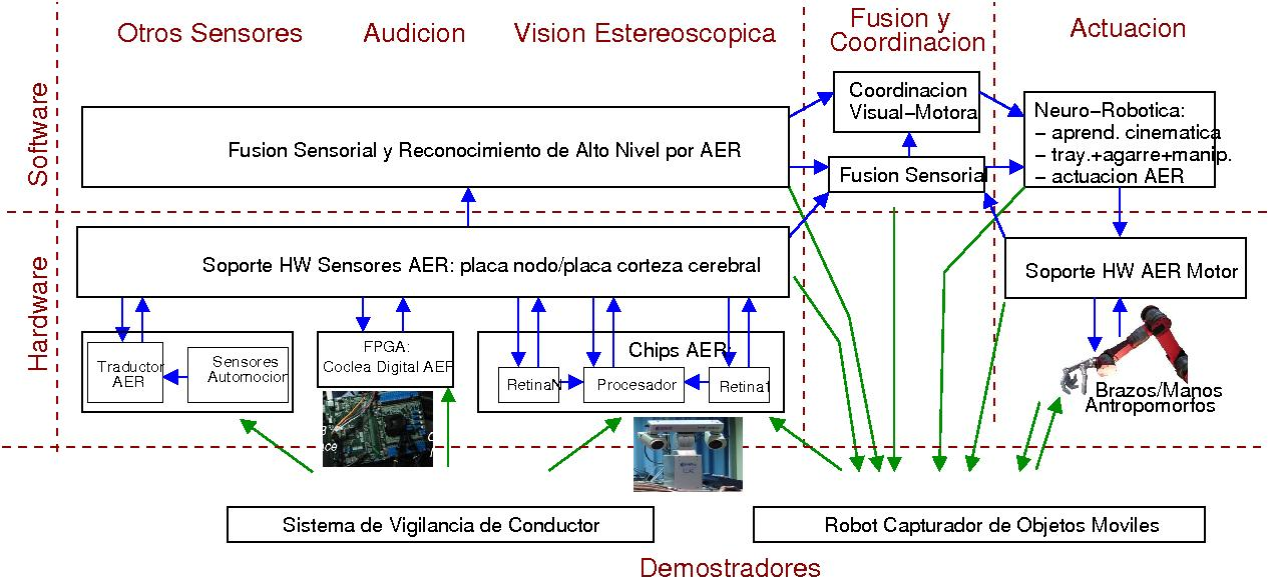Bioinspired event-based system for sensory fusion and neurocortical processing. High-speed low-cost applications in robotics and automotion.
The AER (Adress-Event-Representation) is a bioinspired information sensing and processing technique based on information codification and transmission as a continuous flow of electrical pulses (events), in a similar way as neurobiological systems send and process nervous impulses. The frame concept that appears in classical vision processing, and that biological systems completely lack, also disappears in AER systems. In previous national and international projects, the participants have demostrated the great potential of AER technology to sense and process high-speed vision,
and to actuate on the perception and actuating subsystems in the neuro-robotics field. The participants have developed microchips for vision sensing and processing, that have been embedded in hybrid processing systems with FPGAs, and have been proved in an incipient way in the automotive and robotics industrial fields.
The BIOSENSE project intends to build a bioinspired sensing-processing-actuating robotic platform based on modular AER technology. In that platform, the visual-motor coordination among several cameras for 3D vision, auditive cochleas and motor actuation on a high number of motors (more than 10) should be virtually instantaneous, with delays in the order of mili seconds or even lower. This platform will allow us to face problems of auditive and 3D visual sensing, sensory fusion, processing and decision taking, as well as motor actuation, still unsolved in the field of survaillance and robotics.
The BIOSENSE platform will include multisensorial AER information: a 3D vision system based on the interconnection of two and more AER retinae, AER audition, AER tactile sensing and propioceptive sensing. The sensor fusion in the event domain will be studied as well as its integration with sensing information coming from commercial automotion sensors. New visual retina and auditive cochlea sensing microchips and new neurocortical event (nervous impulses) processors using 3D highintegration CMOS technology will be developed. This microchips will be combined with last-generation FPGAs to maximize system reconfigurability and adaptability, and will be integrated in demonstrators for automotive and robotics.
The sensorial information will be processed by a system composed by the interconnection of programmable AER processing modules with reconfigurable topology. The system will emulate biological brain cortex hierarchical structure.
The BIOSENSE platform will include an antropomorph bimanual robotic module, with cognitive self-learning of manipulation tasks, that will be operated through AER domain motor control. Thus, maximizing the mechanical speed response as well as allowing the coordinated multi-motor control
In the BIOSENSE project, we will also study the learning problem in the event domain using STDP (spike time dependent plasticity) techniques, coming from neuroscience, not only to learn the synaptic weights in the brain cortex and for trajectory self-programming and learning, but also at the motor actuation control level.
The potential of the knowledge and technology developed in BIOSENSE will be demonstrated in two concrete applications where the speed requirements limit the success of classical frame-based processing systems. The first one is a system for supervision of driver behaviour inside a vehicle. The second one is a robot catching and manipulating high-speed moving objects.
PI: Alejandro Linares Barranco
Type: Plan Nacional del 2012
Reference: TEC2012-37868-C04-02
Funding by: Ministerio de Economía y Competitividad
Start date: 01-01-2013
End date: 31-12-2015
Researchers:
Claudio Antonio Amaya Rodríguez
Daniel Cascado Caballero
Elena Cerezuela Escudero
Antonio Abad Civit Balcells
Fernando Díaz del Río
Juan Pedro Dominguez Morales (alta: 01/03/2015)
Manuel Jesús Domínguez Morales
Juan Luis Font Calvo (baja: 31/10/2013)
Francisco Gómez Rodríguez
Jim Harkin
Ángel Francisco Jiménez Fernández
Gabriel Jiménez Moreno
Manuel Ramón López Torres
Carlos Daniel Luján Martínez
J. Mcdaid Liam
Lourdes Miró Amarante
Rafael Jesús Montero González
Arturo Morgado Estevez (alta: 21/01/2013)
María José Morón Fernández
Rafael Paz Vicente
Fernando Pérez Peña (alta: 21/01/2013)
Manuel Rivas Pérez
Carlos Rodríguez Cordón
Miguel Ángel Rodríguez Jodar
Jesus Rodriguez Leal
Javier Jesus Salmeron Garcia (alta: 01/03/2014)
José Luis Sevillano Ramos
Saturnino Vicente Díaz


